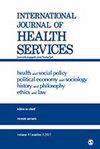Disclosure of Pharmaceutical Industry Funding of Patient Organisations in Nordic Countries: Can Industry Self-Regulation Deliver on its Transparency Promise?
IF 3.4
4区 医学
Q1 HEALTH CARE SCIENCES & SERVICES
引用次数: 4
Abstract
Pharmaceutical companies regularly fund patient organizations. It is important for patient organizations’ credibility that there be transparency regarding this financial support. In Europe, the pharmaceutical industry promises to deliver transparency through self-regulation, as opposed to legally binding provisions, but self-regulation's effectiveness is contested. We compared the industry's transparency of funding in four Nordic countries that, given their general reputation for high transparency, offered a critical test of self-regulation's ability to deliver on its transparency promise. For 2017–2019, we compared: national rules regarding funding disclosure; disclosure practices as evidenced by the availability, accessibility, and format of company transparency reports; and disclosure data, including payment descriptions and sums. Transparency problems differed in kind and magnitude between countries. In Norway and Finland, unlike in Sweden and Denmark, data on funding were difficult to access and analyze and sometimes seemed incomplete or missing. We explain that a key factor allowing for country differences is the freedom given to a country's pharmaceutical industry trade associations to form self-regulatory rules, provided they do not fall below the weak, European-level minimum requirements. Transparency could be improved by aligning rules and practices with the FAIR data principles: that is, corporate disclosures should be findable, accessible, interoperable, and reusable.北欧国家医药行业对患者组织的资金披露:行业自律能否兑现其透明度承诺?
制药公司定期资助患者组织。这种财政支持的透明度对患者组织的信誉至关重要。在欧洲,制药行业承诺通过自我监管来实现透明度,而不是通过具有法律约束力的规定,但自我监管的有效性受到质疑。我们比较了四个北欧国家的行业融资透明度,考虑到它们在透明度方面的普遍声誉,这为自我监管履行其透明度承诺的能力提供了一个关键的考验。2017-2019年,我们比较了:有关资金披露的国家规则;以公司透明度报告的可获得性、可获取性和格式为证据的披露实践;以及披露数据,包括付款说明和金额。各国之间的透明度问题在种类和程度上都有所不同。与瑞典和丹麦不同,挪威和芬兰的资金数据难以获取和分析,有时似乎不完整或缺失。我们解释说,允许国家差异的一个关键因素是给予一个国家的制药行业贸易协会形成自我监管规则的自由,前提是它们不低于弱的、欧洲水平的最低要求。通过使规则和实践与公平数据原则保持一致,可以提高透明度:也就是说,公司披露应该是可查找的、可访问的、可互操作的和可重用的。
本文章由计算机程序翻译,如有差异,请以英文原文为准。
求助全文
约1分钟内获得全文
求助全文
来源期刊
CiteScore
4.50
自引率
2.90%
发文量
41
审稿时长
>12 weeks
期刊介绍:
The International Journal of Health Services is a peer-reviewed journal that contains articles on health and social policy, political economy and sociology, history and philosophy, ethics and law in the areas of health and well-being. This journal is a member of the Committee on Publication Ethics (COPE).

 求助内容:
求助内容: 应助结果提醒方式:
应助结果提醒方式:


